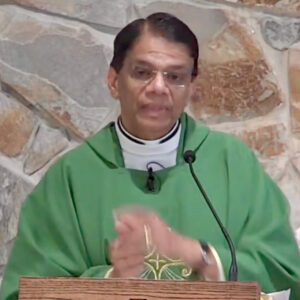We need background to understand what’s happening in today’s First Reading. Babylon having been defeated, King Cyrus of Persia decreed that the exiled Jews could return home to Jerusalem. They rebuilt their ruined temple and under Nehemiah finished rebuilding the city walls.
The stage was set for the renewal of the covenant and the re-establishment of the Law of Moses as the people’s rule of life. That’s what’s going on in today’s First Reading, as Ezra reads and interprets the Law and the people respond with a great “Amen!” Israel, as we sing in today’s Psalm, is rededicating itself to God and His Law. The scene seems like the Isaiah prophecy that Jesus reads from in today’s Gospel.
Please read all of Isaiah 61. The “glad tidings” Isaiah brings include these promises: the liberation of prisoners; the rebuilding of Jerusalem, or Zion; the restoration of Israel as a kingdom of priests; and the forging of an everlasting covenant. It sounds a lot like the First Reading.
Jesus, in turn, declares that Isaiah’s prophecy is fulfilled in Him. The Gospel scene, too, recalls the First Reading. Like Ezra, Jesus stands before the people, is handed a scroll, unrolls it, then reads and interprets it. If you compare Luke 4:16–17, 21 and Nehemiah 8:2–6, 8–10, you will get it clearly.
We witness in today’s Liturgy the creation of a new people of God. Ezra started reading at dawn of the first day of the Jewish new year. Jesus also proclaims a “sabbath,” a great year of Jubilee, a deliverance from slavery to sin, a release from the debts we owe to God. The people greeted Ezra “as one man.” And, as today’s Epistle teaches, in the Spirit the new people of God—the Church—is made “one body” with Him.
The Gospel is the all-powerful and all-merciful word of God for us today. It’s a life-giving word that has supernatural power to change, transform, and bring freedom and healing to those who accept it as the living word of God. When the president of the synagogue called on Jesus to read from the book of the prophet Isaiah, Jesus chose to read Isaiah’s description of what the Messiah would do when he came to restore God’s kingdom for the people of Israel.
The Lord Jesus speaks this same word to each of us today—he comes to bring us healing and restoration, pardon, and freedom from the oppression of sin, despair, hopelessness, and destruction. We shall believe his word with expectant faith and trust. The Lord will not refuse to pour out his Spirit on all who trust in him. Ask the Lord Jesus to renew in us the joy of the Gospel and the freedom to live each day with trusting faith, joyful hope, and fervent love.
Love and prayers,
Fr. Charley
